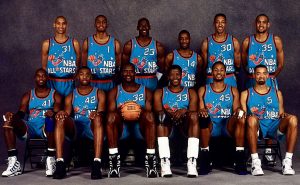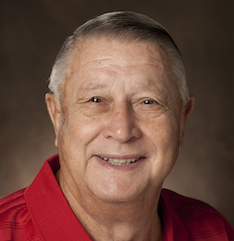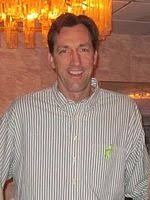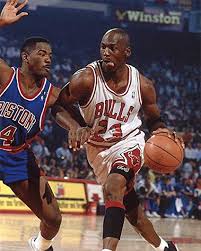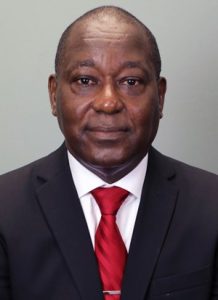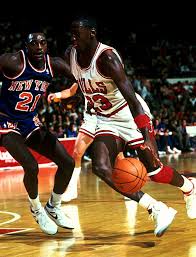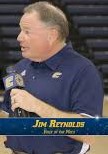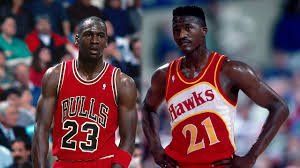When the NCAA tourney got canceled in March we entered a whole new world, which included a sports void the likes of which we have never seen before. The fine folks at ESPN came to the rescue in mid-April with “The Last Dance”, a 10-part miniseries about the 1998 Chicago Bulls and their quest to win a 6th NBA title in an 8-year span before Coach Phil Jackson and most of his star players all went their separate ways. While it has been comforting to spend the past several Sunday nights with behind-the-scenes stories from Steve Kerr/Scottie Pippen/Dennis Rodman, the star of the show as always is Michael Jordan. Even though the documentary concluded on May 17th, HoopsHD’s Jon Teitel has dug through his archives and discovered oodles of unpublished interviews about Jordan’s career, from his early days as the leading scorer for team USA at the 1983 Pan Am Games to a 55-PT playoff performance during Chicago’s final title run in 1998. We continue our trip down memory lane by chatting with 2-time NBA All-Star Terrell Brandon about playing against Jordan in the 1992 Eastern Conference Finals and later becoming his Eastern Conference All-Star teammate.
At Grant High School you won a pair of Oregon Class AAA state titles in 1986 & 1988 and lost the title game in 1987: what did it mean to you to win 2 titles, and how close did you come to winning 3 in a row? We came really close. It was a roller coaster for me: after winning it as a sophomore I thought we would just keep winning every year but I got a reality check during my junior year that it was not as easy as it looked. It taught me to stay focused and do what you have to do.
In 1988 you were named Oregon high school POY: what did it mean to you to win such an outstanding honor? I think that every high school player wants to be known as the best in their own state. It meant a lot to me because I was able to come back and win the award even after breaking my ankle.
In 1991 at Oregon you averaged 26.6 PPG (the 3rd-highest average in conference history) and were named All-American/conference POY: do you feel like you are 1 of the best players in Pac-10/Pac-12 history? I hope so: when people break my game down they will see that my stats were pretty good and we made it to the 1990 NIT. However, we never made the NCAA tourney and I did not stay there for 4 years so I might be forgotten.
In the summer of 1991 you were selected 11th overall by Cleveland (6 spots behind Steve Smith): did you see that as a validation of your college career, or the realization of a lifelong dream of reaching the NBA, or other? Considering I was coming out of Oregon and foregoing my senior year, it was remarkable for my family and our basketball program. I will always appreciate the Cavaliers for drafting me and believing in me.
Take me through the 1992 playoffs:
You beat the Celtics in Game 7 of the Eastern Conference Semifinals (the final game of Larry Bird’s career): how excited was the city of Cleveland after that win? We were extremely excited to beat the Big 3 of Bird/Robert Parish/Kevin McHale and it was extra-special for us to beat them in Boston. Boston coach Chris Ford sent Bird back into the game in the last minute to get 1 final standing ovation. Coach Lenny Wilkens sent me over to check into the game as well and Bird looked at me and said, “Well, I guess that’s it for me but it looks like you’re going to be a nice player someday”. He told me to try to stick around for 10 years: for a legend like him to pay attention to a rookie like me gave me a lot of confidence.
Michael Jordan/Scottie Pippen each scored 29 PTS in a 5-PT win by the eventual champion Bulls in Game 6 of the Eastern Conference Finals: what was it like to play against Chicago in the middle of their 1st 3-peat? It was exciting…but also basketball hell! We wanted to beat them so bad but they were just so good. People ask me about those games against the Bulls and I tell them that it was just an honor to play against the best player ever and 1 of the best teams of all time.
After being a teammate of Jordan’s at the 1996 All-Star Game, you had 10 PTS/8 AST in 17 minutes at the 1997 All-Star Game at Gund Arena: what was it like to play so well in an All-Star Game on your home court? It meant a lot to me because I made it to back-to-back All-Star games in 1996/1997. The 1st time that you get selected people just feel like you had 1 good year…but the 2nd time that you get chosen it feels like you get accepted into the fraternity. My adopted hometown of Cleveland treated me great: it was also the 50th anniversary of the All-Star Game so all the great players from the past came back for a reunion. It also helped that we won the game, which is the main part of the weekend.
In 1997 Sports Illustrated labeled you “The Best Point Guard in the NBA” and you were awarded the NBA Sportsmanship Award for your work with children: which of these 2 things meant more to you? The Sportsmanship Award meant more to me. It probably means more than anything else I have ever accomplished because it represents what I did as a man off the court. It was important because I got to represent all of the Brandons across the country.
Even though your career was cut short due to recurring knee injuries you still rank in the top-70 all-time in both career APG/SPG: how frustrating was it to not be able to go out on your own terms? Every player wants to go out on their own terms. You can envision saying goodbye because it occasionally creeps into your mind. I thought about signing with the Cavs and maybe playing 1 final game in Cleveland before retiring. However, nobody can predict when they are going to get hurt and when the doctor says that your playing days are over it is just meant to be. I played a long time for a guy who was only 5’11”!
Your career 87.3 FT% remains in the top-25 all-time: what is your secret for FT shooting? I give the credit to my dad. I missed some FTs in a game back when I was in 2nd or 3rd grade and when I got home that night he asked me why I missed them. I told him that I could not make them all…but he did not like that answer! He explained that they are FREE so I should not miss that many if nobody is guarding me. He got in my head and I figured that I should make at least 85%. An important part of it is psychological but you also have to put in the hard work.
After retiring you opened a barbershop in 1 of Portland’s poorest neighborhoods that has since become a trendy area: why did you choose that neighborhood, and do you have any NBA players as customers? I grew up in this neighborhood so it was a no-brainer for me. This community in Northeast Portland needed help so I stayed here. I have had some Trail Blazers come in as well as opposing players/coaches/broadcasters. I am glad that they trust the fellowship/relationship: we all know how important it is to a player to get his hair cut!

